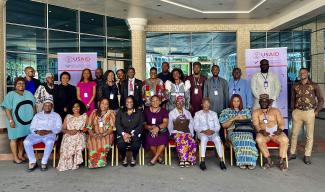Connect and Learn for Sustainable Associations (CLOSA)
In sub-Saharan Africa USAID has supported several private sector associations, which play a critical role in helping business owners, service providers and practitioners overcome common challenges and obstacles. However, sufficient priority has not been given to organizational capacity and management to be member-driven and financially self-reliant to sustain their core operations. In addition, some private sector associations have shifted their priorities to attract donor funding versus appropriately representing the evolving needs of their membership.
The Connect and Learn for Sustainable Associations (CLOSA) project is a USAID funded locally led initiative that aims to (i) connect private sector associations in West Africa with peer associations and private sector experts and (ii) implement and scale up best practices to support and prepare private sector associations to become financially sustainable, commercially viable, and self-reliant.
With a focus on mentoring and coaching and strengthening connections between associations, CLOSA aims to support an adaptive learning process that leverages local and regional expertise and connections to test, adapt and apply evidence from a robust multi-country knowledge-base on building sustainable private sector associations in West Africa.
Journey Towards Sustainability (J2Su)
The Journey Towards Sustainability (J2Su) program works with the West Africa Private Healthcare Federation (WAPHF) or Fédération Ouest Africaine du Secteur Privé de la Santé (FOASPS) to strengthen the organizational capacity and financial sustainability of country private healthcare federations and build a learning community of best practices to sustain private sector associations in West Africa. Under this grant, WAPHF/FOASPS will interact and collaborate with healthcare federations in Benin, Burkina Faso, Côte d’Ivoire, Ghana, Liberia, Mali, Nigeria, Senegal, and Togo. Through coaching, mentoring and grant funds, WAPHF/FOASPS will provide guidance to its member federations to facilitate their progress along the pathway toward sustainability.
Transforming into a Membership-Based Organization to Impact Educators and Marginalized Youth
As gross school enrollment ratios increase across the West African sub region and education policies and curricula are updated, there is a greater need to support the professional growth and abilities of teachers and educators to enhance the achievement of young people. Working in limited resource environments, educators need support to deliver quality in a period when learning challenges are more diverse, gender gaps wider, and the need for employable skills greater than they have ever been for youth.
Within a five-year period, the Transforming into a Membership-Based Organization to Impact Educators and Marginalized Youth program will pilot and expand multiple professional development programs. These are aimed at improving the quality of education delivered in Ghana and Sierra Leone purposed for the benefit of young people in lower-income communities.

